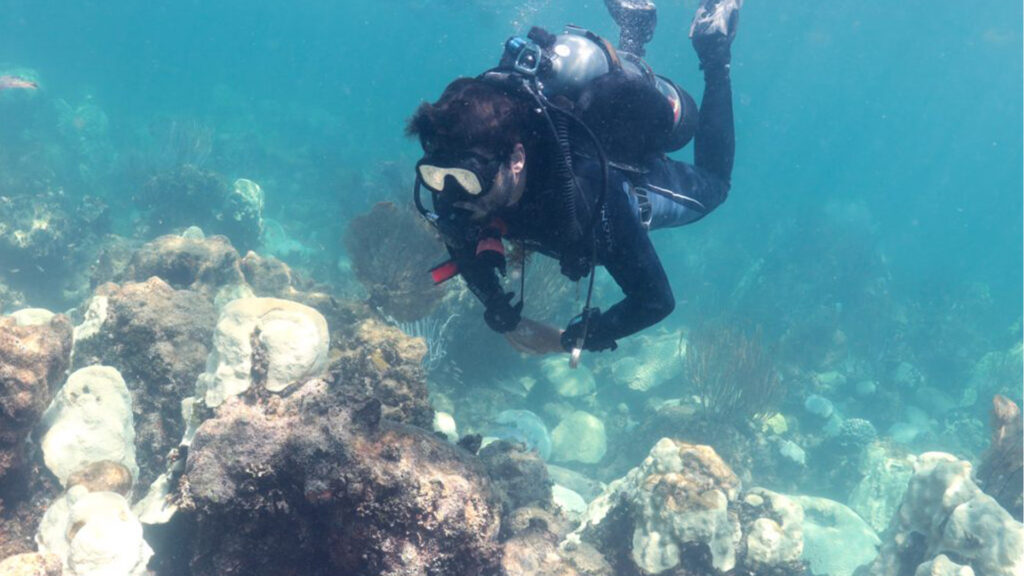By Margaret W. Miller, Citizens’ Climate Lobby
As a coral ecologist, I have worked as a “midwife” for corals in the upper Florida Keys for the past 30 years. I have devoted my career to the assisted reproduction of imperiled corals, observing their spawning and working to monitor the health of our reefs.
Coral reefs provide immense economic and cultural value to our region, and to tropical coastal communities worldwide. It has been estimated that coral reefs in South Florida provide over $300,000 per square km in tourism value alone.
In the last decade, we’ve experienced several severe ocean heat waves where temperatures have risen gradually over the course of the summer until the coral has exceeded its heat tolerance. Sadly, by late August or September, this has occasionally resulted in mass coral bleaching and mortality, most recently in 2014 and 2015.

As our climate warms, exacerbated by heat-trapping gasses from burning fossil fuels, coral ecologists such as myself were prepared to see more bleaching and die-offs. Indeed, models of ocean warming predict such events will occur more frequently, and likely with greater intensity, as global warming continues.
The tipping point that coral ecologists have dreaded was when these events would happen every year as few if any corals could be expected to survive that situation, with no respite, rather than every 7-10 years as observed in the past. However, this was not predicted to occur in South Florida until somewhere between 2030 and 2050.
But we weren’t prepared for the situation we are currently observing, in which water temperatures began skyrocketing in mid-June. By late July, my collaborators and I had observed many corals already bleached or dying from the heat. Though I have experienced the sadness of watching these amazing animals bleach on too many occasions in the past, I have never observed this tragedy to occur before their annual spawning season — generally spanning parts of August and September.
Some coral has survived, making it through to spawn on reefs in the upper Florida Keys and in ocean nurseries in Miami, but many of these corals were in ill health — bleached or pale. We are doing everything we can to mitigate. We have larvae in culture and are working to ensure offspring survive even if their parents succumb to the ongoing continued marine heat wave. Yet, it’s hard to imagine many corals on South Florida reefs enduring another two months of summer heat to come. Rather than annual early fall bleaching events we dreaded to occur in another decade, we are currently watching them cook under what is shaping up to be three full months of prolonged heat stress.
Ironically, the coral’s most immediate hope is a hurricane. Though hurricanes can cause severe damage to coral reefs, as well as human communities, it could save the coral by cooling our coastal waters.
While I do my utmost to care for our coral, our world is warming too fast for these important reefs to prevail without climate action. A rapidly warming world is not compatible with spawning coral, or indeed so many of the precious ecosystems our planet relies on.

I am grateful to U.S. Rep. Carlos Gimenez for cosponsoring legislation such as the American Shores Protections Act and the PROTECT Florida Act, both of which extend moratoriums on oil and gas exploration off of our coasts. Gimenez and his Florida colleague Rep. Maria Elvira Salazar have also joined the newly relaunched House Climate Solutions Caucus, committed to exploring bipartisan climate action.
This is a good start, but if Florida’s ailing marine ecosystems are to survive, human-caused global warming must slow. America’s greenhouse gas emissions increased rapidly last year, and fossil fuel companies — whose products are at the root of our runaway greenhouse gas emissions — raked in billions in profit as they continued their business as usual. We need a nationwide price on such pollution to stop our climate from altering and move our economy toward renewable energy that does not harm our ecosystems.
Congress can no longer be passive on the topic of climate change. Not when across the U.S. — and around the world — back-to-back climate extremes are causing deaths, destruction and ecological devastation.
We need our leaders to connect the dots. To grasp the scale of the threat. To save our vital and vulnerable coral reefs and our planet’s fragile future.
Margaret W. Miller is a volunteer with the Miami chapter of Citizens’ Climate Lobby and the research director for SECORE International.
If you are interested in submitting an opinion piece to The Invading Sea, email Editor Nathan Crabbe at ncrabbe@fau.edu. Sign up for The Invading Sea newsletter by visiting here.



